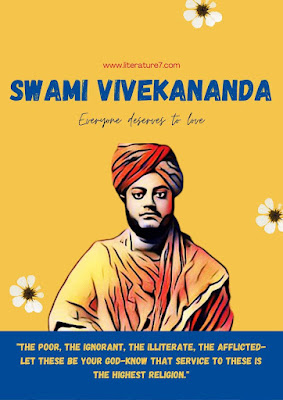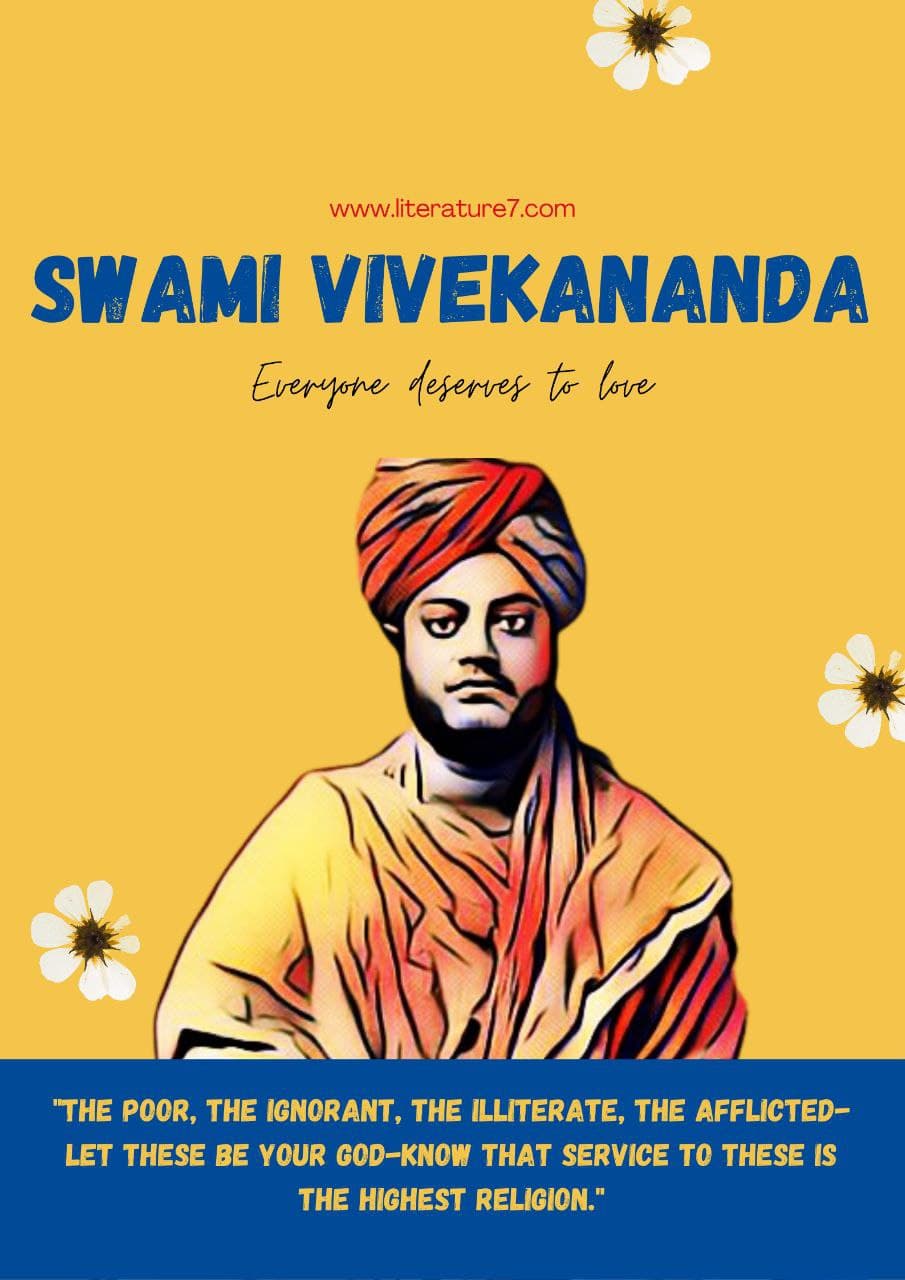Swami Vivekananda role in the development of Indian civilization culture and nationalism

Swami Vivekananda played a vital role in the growth of Indian culture, civilization, and nationalism. The ‘Ramakrishna Mission‘ was established by Ramakrishna Paramahansa; the name was conferred through Swami Vivekananda. Ramakrishna played an essential role in developing the old reverence and honor in the Hindu religion.
Early Life of Swami Vivekananda
The first nickname that was given to Swami Vivekananda used to be Narendra Nath Dutta. His birth year was 1863 A.D. in a rich family from Calcutta. He attended an English school and later graduated from the Calcutta’s University of Calcutta. He was a student of John Stuart Mill and Herbert Spencer in depth. At first, he was drawn by the Brahmo Samaj. Later, following the advice of a member of his household, he visited Dakshineshwar Temple to pay homage to Swami Ramakrishna Paramahansa. When he saw him, Ramakrishna said at one point, “You became quite late. You have taken birth as an incarnation of Lord Narayan.”
There was a clear disagreement between Ramakrishna Parmahansa as well as Swami Vivekananda. Ramakrishna was the symbol of Hinduism, while Narendra Nath was heavily influenced Western education system and was a believer in intellectualism and argumentation. However, his beliefs were transformed with time, and he was a firm fan of the Ramakrishna Paramahansa. As Ramakrishna lay in his final days, He handed over his entire group of disciples to Narendra Nath. He declared, “I leave all these disciples of mine at your disposal. You see that they should remain busy in the spiritual activities and do not go back to their homes.”
Establishment of Matha
After the death of Ramakrishna Parmahansa, a few of his followers, bored of their religious practice, went back to their homes. The real religious beliefs of Swami Vivekananda did not bind them for a long period of time; however, Narendra Nath did not move one inch. Narendra Nath finished Ramakrishna Matha by enlisting the aid of his other disciples. When he began the work, a variety of issues arose due to the lack of funds. Swami Vivekananda said about the difficulties, “If there was rice, there was no salt. For months we took the boiled leaves of the Bimba tree, rice and salt. Even the monsters could have fled before such difficulties, what to speak of man.”
Following the creation in Matha, Narendra Nath came to be popularly known as Swami Vivekananda. Following the accomplishment of the task, he switched to “Bharat Bhraman and came into contact with the deplorable living conditions of the inhabitants of India. In the wake of poverty, illiteracy and dogmatism, and ritualism, he was forced to contemplate the future of Indians. Indian people. At the same time, making a journey to Kanyakumari when he discovered the All-World Religions Conference scheduled to take place in Chicago.
Swami Vivekananda decided to be a participant in the All-World Religions Conference. He had no money to travel to America. However, he made the trip despite numerous obstacles and obstacles. Swami Vivekananda passed away at the age of 1902 A.D. at the age of 39. Work-related stress had damaged his health; however, the work he performed during his life was the most significant contribution he made to the country.
All World Religious Conference
His inaugural speech at his first speech at the All-World Religious Conference received huge applause. The charismatic personality of Swami Vivekananda greatly influenced the people of America. New York Herald, a newspaper of the present, was a journalist who wrote regarding the effect on the American people by Swami Vivekananda upon the population in America, “Having heard Swami Vivekananda, we think it foolish to send our missionaries to India.” He was the founder of Vedanta Samaj in America. He also travelled to Europe, including Paris and London, before returning to India through America. After arriving in India, the explorer recommenced his campaign against poverty and inequity widespread in India.
Reforms in Hinduism
Swami Vivekananda established the supremacy of Hinduism throughout the world. He also influenced the nations of Europe to recognize this superiority. On the foundations the foundation of Hinduism and spiritualism. He contributed to the creation of the Hindu nationality and society that was distinctive. It did not just influence the citizens of our nation but also forced the European countries to recognize that there is a superiority to Hinduism and Hindu spirituality. They also incorporated the principles of equality, charity and human rights, an integral part of their faith.
Read also Explain the importance of the historic battle of Plassey & Buxar
With the founding of the Ramakrishna Mission, Vivekananda brought to life the lessons from his Guru. Swami Vivekananda once said, “Through the voice of disciple, the world is listening to the voice of the Master. The disciple is the dynamic counterpart of the Master.”
Swami Vivekananda has brought spiritualism to life in the realm of religion through his efforts and ability. He made the name India all over the world through the spread of his ideas about spirituality in other countries. He made it so robust and dynamic that it was able to compete with Islam and Christianity effectively. Swami Vivekananda’s actions urged those living in India toward a love of humanity, and a sense of nationwide love and devotion grew in their hearts.
Humanity and Service.
The faith of Swami Vivekananda was not confined to the four walls of the temple, but believed in the well-being of each person. He was particularly concerned with the welfare of humanity. He was determined to eliminate poverty and illiteracy from the world. He once stated, “The poor, the ignorant, the illiterate, the afflicted-let these be your God-know that service to these is the highest religion.”
See more Revolt of 1857 Causes
Political Thinking
Swami Vivekananda was more than a religious and social reformer; however, he was also the most awake man of his age who was extremely well-aware of politics that were plaguing the current society. After studying the present circumstances, he predicted that the time would come in which the masses would control the country, and this would be a result of a change through China and Russia, and his prediction proved to be correct.
Swami Vivekananda also had a key role to play in encouraging the spirit of nationalism. He awakened the Indians from their sleep to let them discover their full potential. The prayer that he offered sparked new energy in those who are Hindus, “Thou Lord of Gauri, O thou mother of the Universe, vouchsafe manliness unto me. O thou mother of strength, take away my weakness, take away my unmanliness, and make me a Man.”
One of the most prominent contemporary scholars has written about his role in promoting the nationalism spirit “Swami Vivekananda might well be known as the father of modern Indian nationalism.” He instilled confidence in the Indians of India and gave them a lesson in patriotic love and respect for their faith. Through his constant labour and hard work, he contributed to the splendour of India.
Conclusion
Swami Vivekananda played an important role in the growth of Indian culture, civilization, and nationalism. His efforts gave new life and vitality to the Hindu religion that was nearly dead. This enhanced its status within India and increased the glories of the Indian religion in other nations. It was thus placed in a position to stand up to the assaults by other religious traditions. This is why the work of Swami Vivekananda is not to be overlooked in the realm of nationalism, awakening and Renaissance. Indeed, Swami Vivekananda’s life was the greatest gift from God for Indian society.
